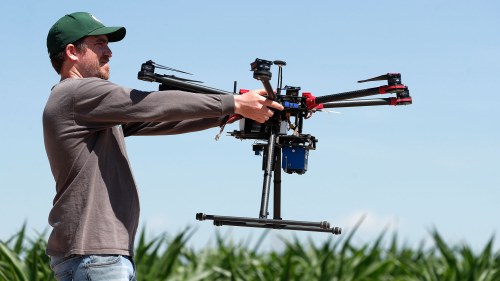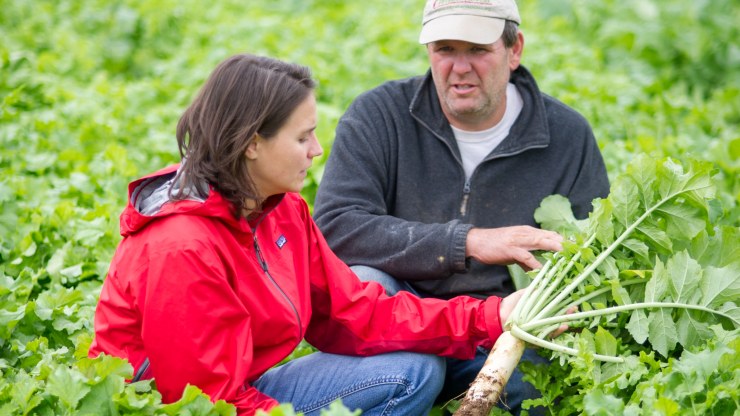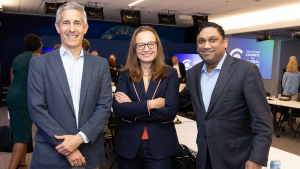Corn Dispute, Ag-Tech Innovation, and Fukushima Wastewater
Check out our roundup of the week's top news and research in food, agriculture, and global development.

Top Story
Fukushima Wastewater Released
Japan has officially started releasing treated wastewater from the Fukushima nuclear power plant into the Pacific Ocean, triggering China’s suspension of all seafood from Japan. China claims the treated wastewater causes radioactive contamination of food products, despite the fact that the International Atomic Energy Agency has concluded the impact of the wastewater is negligible.
Council Insights
Regenerative Agriculture
“Regenerative agriculture can play a key role in helping farmers develop more resilient production systems and mitigate the challenges they face,” argues the Center on Global Food and Agriculture in a new report. Read it on our website.

Food and Agriculture
Ag-Tech Innovation
Technology has promised to revolutionize farming, but most farmers still have not adopted data tools or specialized software despite proof of higher yields. In order to meet the world’s growing demand for food and adapt to extreme weather conditions, it is critical that farmers start integrating technology into their farming practices.
No Deal Necessary
Ukraine is planning to reopen a critical grain-export route through the Black Sea, challenging Russia’s blockade. If the private sector is willing to take the risk, the new route could help export Ukraine’s ample grain harvests.
Corn Dispute
In response to Mexico’s curbs on genetically modified corn imports, the United States is requesting a dispute settlement panel under the North American trade pact. The United States claims Mexico’s ban violates commitments under the US-Mexico-Canada agreement.
Deeper Dive
A New Trade Route
Ukraine’s new trade route through the Black Sea evades Russian interference—but how? By staying close to Ukraine’s border, ships remain out of reach of Russian artillery strikes. Once the ships start moving south, they enter the waters of Romania and Bulgaria, which are under NATO protection.
Resilience
A New Approach
Modern sensors are changing the world of farming. By giving farmers precise data about individual plants, such as when they need more water or fertilizer, the sensors could help farmers adapt to challenges from extreme weather.
DC Report
Grants for Good
Through a 2501 grant, the USDA is helping local Alaskans grow their own fresh food. By conducting training activities, teaching practical skills in agriculture, and doing site visits to help farmers address on-the-ground challenges, the grant helps provide a foundation for Alaskan farmers to be successful.
Big Actors
Indigenous Lands
The Brazilian Senate’s Agriculture Committee approved legislation that does not recognize Indigenous land if it has not been lived on since 1988, a bill backed by the farm lobby. This would ultimately allow commercial agriculture in Indigenous territories, sparking staunch pushback from Indigenous communities.
Big Ideas
Satellites for Food Security
In France, satellite technology is being used to harvest grapes at the right time for wine production. This technology has the potential to help farmers around the world by allowing them to manage fields based on Earth observation data, which focuses on crop disease, pest infection, nutrient needs, water stress, and ideal harvest time.
Ask an Expert
How can data foster inclusiveness and spur innovation in agriculture?
“Data serves as a call, highlighting the areas where we fall short in combating food insecurity. This includes areas such as gender inequality, climate change, education, and food wastage and loss. In a data-rich ecosystem, data reveal pathways and entry points for diverse solutions, setting the stage for collective ingenuity. An enriched data landscape encompassing diverse facets of food insecurity can entice experts from various fields – each equipped with distinct backgrounds, experiences, and expertise – to unite in the endeavor to devise innovative solutions.”
—Nonresident Fellow Jones Kanjira in GFFT


Have a question about food and agriculture? Ask one of our experts at the Center on Global Food and Agriculture to get an answer in next week's Global Food for Thought!
Council Events
Did you miss one of our previous livestreams? Don't worry! They are all available on our website to watch at any time.
Other Upcoming Events
Soil Health & Land Stewardship at First Nations Garden
Date: August 27
Time: 1:00 – 3:00 p.m. CT
Market Concentration in the Grain Industry: Implications for Food Security?
Date: September 7
Time: 9:30 – 11:00 a.m. ET
Annual Backyard Barbecue & Urban Ag Crawl
Date: September 10
Time: 2:00 – 8:00 p.m. CT
Tropentag 2023 - Competing Pathways for Equitable Food Systems Transformation: Trade-Offs and Synergies
Date: September 20 – 22
Feeding Mind, Body, Soul, and Community
Date: September 21
Time: 6:30 – 8:30 p.m. CT
Land Acknowledgement Statement
The Center on Global Food and Agriculture recognizes it occupies the ancestral land of the Kiikaapoi, Peoria, Kaskaskia, Bodwéwadmi, and Myaamia people. Indigenous communities around the world disproportionately experience the pressures of climate change, global conflicts, and the COVID-19 pandemic, while simultaneously stewarding 80 percent of the world’s biodiversity. These Indigenous tribes and nations are the original owners of this land and continue to be systemically erased by policies and practices that ignore their histories. To learn more about Indigenous foodways and practices, check out our 2022 blog series "Stewardship, Sovereignty, and Solutions."
Related Content
- Embracing Dandelions as Food and Medicine
- Going Beyond Regenerative Agriculture on Tribal Lands
- Expanding "638" to Enhance Native American Food Sovereignty
- Flavors and Culture: Food Systems Through Indigenous Women's Eyes
- A Thanksgiving Legacy: Fighting for Indigenous Food Sovereignty
- Native Food Sovereignty: Strengthening Connection to Culture
- Reconnecting to Indigenous Food Sovereignty Values and Practices
- Embracing Interconnectedness: How Indigenous Foodways Can Save Us




